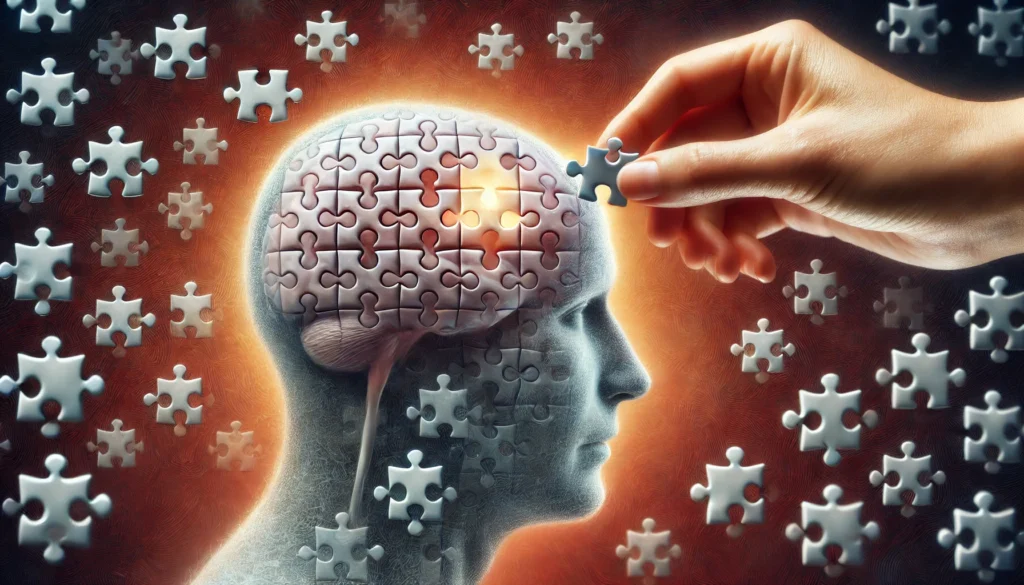In this article, we will delve into the early signs of dementia, differentiate it from normal age-related memory loss, and explore the implications for seniors and their families.
You may also like: Understanding the Science Behind Lost Memory
What is Dementia?
Dementia encompasses a range of neurological conditions, of which Alzheimer’s disease is the most common form. These conditions are characterized by a progressive decline in cognitive function, impacting memory, thinking, and social abilities.
Understanding the Spectrum of Dementia
Dementia is not a one-size-fits-all condition; it represents a spectrum of cognitive impairments with varying symptoms and progression rates. Alzheimer’s disease, vascular dementia, Lewy body dementia, and frontotemporal dementia are among the most recognized forms. Each type has distinct characteristics and impacts individuals differently, requiring tailored approaches to care and management.
The Role of Neurological Changes
The brain undergoes various changes as dementia progresses, including the buildup of proteins and degeneration of brain cells. These neurological changes lead to the symptoms associated with dementia, such as memory loss and impaired cognitive function. Understanding these changes helps in developing targeted treatments and therapies.
Alzheimer’s Disease: The Most Common Form
Alzheimer’s disease accounts for 60-80% of dementia cases and is characterized by gradual memory loss and cognitive decline. It primarily affects older adults, though early-onset Alzheimer’s can occur in individuals as young as their 40s or 50s. Research continues to explore the genetic and environmental factors contributing to Alzheimer’s disease.
Difference Between Dementia and Amnesia
Understanding the distinction between dementia and amnesia is vital. Amnesia refers to memory loss that can occur without other cognitive deficits, often due to brain injury or illness. Dementia, on the other hand, involves multiple cognitive impairments, including memory, language, problem-solving, and other thinking skills.
Memory Loss in Amnesia vs. Dementia
While both amnesia and dementia involve memory loss, the nature and scope differ significantly. Amnesia often results from specific events such as trauma or infection and may be temporary or permanent. In contrast, dementia involves progressive and widespread memory deterioration, affecting various aspects of daily life.
Cognitive Impairments Beyond Memory
Dementia involves a broader range of cognitive impairments beyond just memory loss. These can include difficulties with language, problem-solving, and executive functioning. Understanding these differences is crucial for accurate diagnosis and effective treatment planning.
Causes and Risk Factors
Amnesia and dementia have distinct causes and risk factors. Amnesia is often linked to physical damage to the brain, such as from an injury, while dementia typically results from neurodegenerative processes or vascular issues. Identifying these causes helps in developing prevention and intervention strategies.
Recognizing the Early Signs of Dementia
Early detection of dementia can lead to better management and treatment. Here are some early warning signs to watch out for:
1. Short Term Memory Impairment
One of the most common signs of early dementia is short-term memory loss. This includes forgetting recent events, repeating questions, or misplacing objects frequently. While occasional forgetfulness can be attributed to aging, consistent memory lapses may indicate something more serious.
Differentiating Normal Aging from Dementia
It’s important to distinguish between normal age-related memory changes and those associated with dementia. Normal aging might involve forgetting names or appointments but remembering them later, whereas dementia involves more persistent and severe memory issues that disrupt daily life.
The Impact on Daily Activities
Short-term memory impairment in dementia affects daily activities and routines. For example, individuals may struggle to remember important dates, appointments, or the location of everyday items, leading to frustration and decreased independence.
Strategies for Managing Memory Loss
Several strategies can help manage short-term memory loss, such as using memory aids, establishing routines, and maintaining an organized living environment. These strategies can improve quality of life and promote independence.
2. Difficulty with Complex Tasks
Seniors may struggle with tasks that require multiple steps, such as managing finances or following a recipe. This difficulty goes beyond occasional confusion and becomes a consistent pattern that disrupts daily life.
Recognizing Patterns of Difficulty
Identifying patterns of difficulty with complex tasks is crucial for early detection of dementia. This may include challenges in planning, organizing, or executing tasks that were once easy for the individual, signaling potential cognitive decline.
Impact on Independence
As difficulty with complex tasks increases, it can significantly impact a senior’s independence. Tasks like cooking, managing medications, and handling finances become challenging, necessitating additional support and supervision.

Support and Intervention Strategies
Providing support and intervention can help manage the challenges associated with complex task difficulties. This may include simplifying tasks, providing step-by-step instructions, and utilizing assistive technology to aid in task completion.
3. Changes in Mood and Personality
Noticeable shifts in mood, such as increased anxiety, depression, or irritability, can be early signs of dementia. Seniors may also become more withdrawn or less interested in social activities they once enjoyed.
Identifying Mood Changes
Monitoring mood changes is essential for detecting early signs of dementia. These changes can be subtle at first, such as increased irritability or apathy, but may progress to more pronounced emotional fluctuations.
Social Withdrawal and Isolation
Social withdrawal is a common behavioral change in dementia, as individuals may feel overwhelmed or embarrassed by their cognitive challenges. Encouraging social interaction and providing emotional support can help mitigate these effects.
Addressing Emotional Wellbeing
Addressing emotional wellbeing is vital for individuals experiencing mood changes associated with dementia. Counseling, support groups, and medication can be beneficial in managing anxiety, depression, and other emotional challenges.
4. Language Problems
Struggling to find the right words, following conversations, or naming familiar objects can be indicative of early dementia. These language difficulties are typically more pronounced than the occasional word-finding difficulties experienced with normal aging.
Recognizing Language Difficulties
Language difficulties in dementia manifest as problems with word-finding, comprehension, and communication. These challenges can lead to frustration and social withdrawal, making it essential to recognize and address them early on.
Impact on Communication
Language problems can significantly impact communication, leading to misunderstandings and difficulties in expressing thoughts and needs. Support from speech therapists and communication aids can help improve language skills and interaction.
Strategies to Improve Communication
Implementing strategies to improve communication can enhance quality of life for individuals with dementia. These may include speaking slowly, using simple language, and encouraging non-verbal communication methods.
5. Poor Judgment and Decision Making
Seniors with dementia may exhibit poor judgment or make decisions that are not typical of their past behavior. This can include financial decisions, such as giving away money to telemarketers, or neglecting personal hygiene.
Identifying Poor Judgment
Identifying poor judgment involves recognizing decisions that deviate from an individual’s typical behavior and values. This can manifest as impulsive actions or neglecting important responsibilities.
Financial Vulnerability
Financial vulnerability is a significant concern for seniors with dementia, as they may fall victim to scams or make uncharacteristic financial decisions. Implementing safeguards, such as financial monitoring, can help protect their assets.
Supporting Decision-Making
Supporting decision-making in individuals with dementia involves providing guidance and oversight while respecting their autonomy. Encouraging involvement in decision-making processes can help maintain their dignity and self-esteem.
6. Disorientation
Getting lost in familiar places or forgetting the time, date, or season are common early signs of dementia. This disorientation can become more frequent as the condition progresses.
Recognizing Signs of Disorientation
Recognizing signs of disorientation involves monitoring changes in spatial awareness and orientation to time. Frequent confusion or getting lost in familiar environments may indicate cognitive decline.
Impact on Safety
Disorientation can compromise safety, leading to increased risk of accidents or wandering. Implementing safety measures, such as GPS tracking devices or home modifications, can help ensure the individual’s safety.
Strategies for Managing Disorientation
Strategies for managing disorientation include establishing routines, using visual cues, and providing clear, simple directions. These approaches can help individuals navigate their environment more effectively.
Why is My Memory So Bad?
Memory loss in seniors can be attributed to various factors, including stress, lack of sleep, and certain medications. However, when memory loss becomes more pronounced and affects daily functioning, it may be an early sign of dementia.
Short Term Memory Loss in Seniors
Short-term memory loss is often one of the first indicators of cognitive decline. It is essential to differentiate between normal forgetfulness and memory loss that may signal a more serious issue.
Common Causes of Memory Loss
Common causes of memory loss in seniors include stress, sleep deprivation, and medication side effects. Addressing these factors can help improve memory and cognitive function.
When to Seek Medical Advice
It’s crucial to seek medical advice if memory loss becomes severe or persistent. Early diagnosis can lead to better management and treatment options, potentially slowing the progression of cognitive decline.
Interventions for Memory Improvement
Interventions for memory improvement include lifestyle changes, cognitive exercises, and medications. These approaches can help enhance memory and overall cognitive function.
Forgetfulness vs Dementia
While forgetfulness can be a normal part of aging, dementia involves more severe memory loss and cognitive impairment. Forgetfulness may involve misplacing items or forgetting appointments, whereas dementia may include forgetting familiar names, faces, or recent events.
Understanding Normal Aging
Understanding normal aging involves recognizing typical memory changes, such as slower recall or occasional forgetfulness, and distinguishing them from signs of dementia. Education on normal aging can alleviate unnecessary concerns.
Signs of Cognitive Impairment
Signs of cognitive impairment in dementia include more pervasive memory issues, confusion, and difficulties with daily tasks. Identifying these signs early can lead to timely intervention and support.
Seeking Professional Evaluation
Seeking professional evaluation is essential if cognitive impairment is suspected. Healthcare professionals can conduct assessments to determine the presence and extent of dementia, guiding appropriate care and management.

Who is Most Likely to Have Memory Difficulties?
Age is the most significant risk factor for dementia, with the likelihood increasing as one grows older. However, dementia is not an inevitable part of aging. Other risk factors include:
- Family history of dementia
- Cardiovascular health issues
- Diabetes
- Smoking and alcohol use
- Sedentary lifestyle
Age and Dementia Risk
Age is the most significant risk factor for dementia, with the likelihood increasing as one grows older. However, dementia is not an inevitable part of aging. Understanding the role of age can help in planning for potential cognitive challenges.
Genetic Predisposition
A family history of dementia can increase an individual’s risk of developing the condition. While genetics play a role, lifestyle and environmental factors also contribute to dementia risk, highlighting the importance of a holistic approach to prevention.
Lifestyle and Health Factors
Lifestyle and health factors, such as cardiovascular health, diabetes, smoking, and sedentary behavior, significantly impact dementia risk. Adopting a healthy lifestyle, including regular exercise and a balanced diet, can reduce the likelihood of cognitive decline.
What are the 10 Warning Signs of Dementia?
- Memory loss affecting daily life
- Difficulty planning or solving problems
- Struggling with familiar tasks
- Confusion with time or place
- Trouble with visual or spatial relationships
- Language difficulties
- Misplacing things frequently
- Poor judgment
- Withdrawal from social activities
- Changes in mood or personality
Detailed Overview of Each Sign
Each of the 10 warning signs of dementia represents a specific aspect of cognitive decline. Understanding these signs in detail can aid in early detection and intervention, providing a roadmap for recognizing potential dementia in its earliest stages.
Importance of Early Detection
Early detection of dementia is crucial for effective management and treatment. Identifying warning signs early allows for timely intervention, potentially slowing disease progression and improving quality of life.
Seeking Professional Assessment
If any warning signs of dementia are observed, seeking professional assessment is essential. Healthcare professionals can conduct comprehensive evaluations to confirm a diagnosis and develop a personalized care plan.
Early Signs of Dementia in Men and Women
While the signs of dementia can be similar across genders, some studies suggest that men may experience more significant memory deficits early on, while women might exhibit more pronounced mood changes. However, these differences are not definitive and can vary widely among individuals.
Gender Differences in Dementia Symptoms
Research indicates potential gender differences in dementia symptoms, with men possibly experiencing more memory issues and women showing greater mood changes. Understanding these differences can inform personalized approaches to care and support.
Factors Influencing Gender Differences
Factors such as hormonal differences, social roles, and lifestyle choices may influence gender differences in dementia symptoms. Exploring these factors can provide insights into tailored prevention and intervention strategies.
Personalized Care Approaches
Personalized care approaches consider individual differences in dementia symptoms and progression. By recognizing gender-specific patterns, caregivers and healthcare providers can develop more effective care plans.
Early Signs of Dementia Test
There are various cognitive tests available to assess the possibility of dementia. These tests are typically conducted by healthcare professionals and can help determine the presence and extent of cognitive impairment.
Types of Cognitive Tests
Cognitive tests for dementia include memory assessments, problem-solving tasks, and language evaluations. These tests provide a comprehensive overview of cognitive function and help identify areas of concern.
Importance of Professional Evaluation
Professional evaluation using cognitive tests is crucial for accurate diagnosis and treatment planning. Healthcare professionals can interpret test results and recommend appropriate interventions based on individual needs.
Preparing for Cognitive Testing
Preparing for cognitive testing involves understanding the process, gathering necessary information, and discussing any concerns with healthcare providers. Being prepared can help reduce anxiety and ensure a smooth testing experience.
When to Seek Help
If you notice any of the early signs of dementia in yourself or a loved one, it is crucial to seek medical advice. Early diagnosis can lead to better management and treatment options, improving the overall quality of life.
Recognizing the Need for Help
Recognizing the need for help involves being aware of changes in cognitive function and behavior. If any warning signs of dementia are observed, it is important to seek professional advice promptly.
Encouraging Loved Ones to Seek Help
Encouraging loved ones to seek help requires compassion and understanding. Open communication and support can help overcome resistance and facilitate access to necessary medical evaluation and care.
Planning for Medical Consultation
Planning for a medical consultation involves preparing questions, documenting symptoms, and gathering relevant medical history. This preparation can enhance the effectiveness of the consultation and ensure all concerns are addressed.
Does My Parent Have Dementia?
If you suspect that your parent or grandparent is showing signs of dementia, it is essential to approach the situation with compassion and understanding. Encourage them to see a healthcare professional for a comprehensive evaluation.
Approaching the Conversation
Approaching the conversation about dementia with a loved one requires sensitivity and empathy. Acknowledging their feelings and expressing concern can help facilitate a constructive dialogue.
Supporting Loved Ones Through Diagnosis
Supporting loved ones through a dementia diagnosis involves providing emotional support, helping with daily tasks, and exploring treatment options together. Building a support network can enhance their quality of life.
Navigating Care Options
Navigating care options for a loved one with dementia involves exploring available resources, including home care, assisted living, and specialized dementia care facilities. Understanding these options can help in making informed decisions.
Conclusion
Recognizing the early signs of dementia can be challenging but crucial for early intervention and management. Understanding the difference between normal forgetfulness and dementia, along with knowing the warning signs, can empower seniors and their families to seek timely help. By staying informed and proactive, you can better support your loved ones through their cognitive health journey.
The Importance of Awareness and Education
Awareness and education about dementia are vital for early recognition and intervention. By understanding the signs and symptoms, individuals and families can take proactive steps to seek appropriate care and support.
Encouraging a Supportive Environment
Creating a supportive environment for individuals with dementia involves fostering understanding, patience, and empathy. Encouraging open communication and providing resources can enhance the quality of life for both individuals and their caregivers.

Continuing Research and Advocacy
Continuing research and advocacy are essential for advancing understanding and treatment of dementia. Supporting scientific research and advocating for policy changes can contribute to better outcomes for those affected by dementia.
Further Reading:
The differences between normal aging and dementia
Do You Have Early Signs of Dementia?
15 Warning Signs of Dementia You Shouldn’t Ignore
Important Note: The information contained in this article is for general informational purposes only, and should not be construed as health or medical advice, nor is it intended to diagnose, prevent, treat, or cure any disease or health condition. Before embarking on any diet, fitness regimen, or program of nutritional supplementation, it is advisable to consult your healthcare professional in order to determine its safety and probable efficacy in terms of your individual state of health.
Regarding Nutritional Supplements Or Other Non-Prescription Health Products: If any nutritional supplements or other non-prescription health products are mentioned in the foregoing article, any claims or statements made about them have not been evaluated by the U.S. Food and Drug Administration, and such nutritional supplements or other health products are not intended to diagnose, treat, cure, or prevent any disease.


